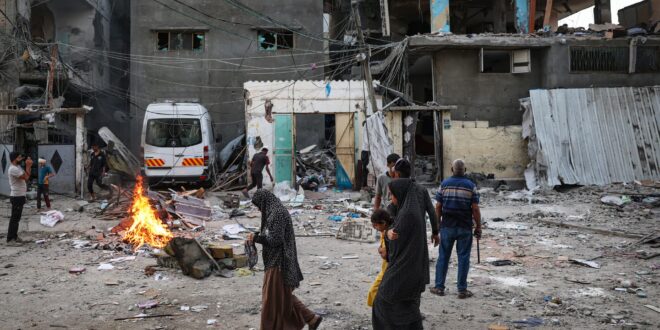ICJ cites “immediate risk” to Palestinians.
The International Court of Justice ruled Friday that Israel must immediately halt its offensive in Rafah, in the southern part of the Gaza Strip.
The court cited the “immediate risk” to Palestinians of a further Israeli military assault in the coastal enclave.
Israel must “immediately halt its military offensive, and any other action in the Rafah governorate, which may inflict on the Palestinian group in Gaza conditions of life that could bring about its physical destruction in whole or in part,” the court ruled.
The ICJ also ordered Israel to open the Rafah border crossing with Egypt for the entry of humanitarian aid at scale; ensure access to Gaza for investigators and fact-finding missions; report to the court within a month on its progress in applying these measures.
The court’s rulings are legally binding but the ICJ itself has no enforcement powers.
Israel has been carrying out a retaliatory assault on the Gaza Strip since October last year, when Hamas militants conducted a violent attack on Israel, killing around 1,200 people and taking hundreds of hostages. According to estimates, Israel has killed more than 30,000 people during its war on Gaza, drawing outrage from around the world.
On the hostages being held in Gaza, Judge Nawaf Salam, president of the court, added, “The court expresses grave concern over the fate of the hostages… and calls for their immediate and unconditional release.”
Human rights advocates praised the ICJ’s order.
“The International Court of Justice’s order underlines the gravity of the situation facing Palestinians in Gaza, who have for months endured the blocking of basic services and humanitarian aid amid continued fighting,” said Balkees Jarrah, associate international justice director at Human Rights Watch. “Nowhere in Gaza is safe, and civilians there are facing famine — and yet the Israeli government continues to flout the World Court’s binding orders by obstructing the entry of lifesaving aid and services.”
“The ICJ’s decision opens up the possibility for relief, but only if governments use their leverage, including through arms embargoes and targeted sanctions, to press Israel to urgently enforce the court’s measures,” he added.
Israeli representatives were furious at the court’s ruling.
“There is no power in the world that will push us to commit a public suicide, because that’s what this is, to stop our war against Hamas,” Israeli government spokesperson David Mencer told the BBC.
Prime Minister Benjamin Netanyahu’s office says he will consult senior ministers by phone shortly but a senior official told POLITICO the government is unlikely to accede to the court’s demand.
Speaking on the condition of anonymity so they could speak ahead of a formal public position, the official said: “The Prime Minister has been clear all along that the mission to eliminate Hamas won’t be stopped before we have met our goal. And we believe the only way to get our hostages back is to maintain military pressure on Hamas.”
According to the official, the court’s order is not a blanket one and that it is only ordering a halt to offensive operations in Rafah if Israel can’t ensure safety of the civilian population. The official also disputed the instruction to open the Rafah border crossing, arguing that the crossing has not been closed by Israel but by Egypt.
“It is clear that the UN’s court was not guided by international law or human rights, but was a political move aimed to coincide with the indefensible actions of the ICC prosecutor equating Israel to Hamas,” Anne Herzberg of NGO Monitor said.
“The decision is based upon blatantly false information provided to the Court by South Africa’s legal team and to advance the apparent objective of keeping Hamas in power in Gaza,” she added. “Given that there is no legal foundation, nor moral justification for this opinion, Israel should not, and I expect will not, abide by the ICJ’s decision.”
Earlier this month, the EU urged Israel to halt its military operation in Rafah immediately. Not doing so would “inevitably put a heavy strain on the EU’s relationship with Israel,” the EU’s chief diplomat Josep Borrell said.
“We will have to choose between our support for international institutions and the rule of law and our support for Israel,” Borrell said on Friday at a conference in Florence. “Both things will be quite difficult.”
Belgian Foreign Minister Hadja Lahbib welcomed the ICJ’s decision and called for it’s immediate implementation.
“The violence and human suffering in Gaza must stop,” Lahbib said.
Janez Lenarčič, European Commissioner for Crisis Management, said that the “ICJ’s orders are binding on the Parties and they must comply with them.”
“I expect their full and immediate implementation,” he said.
 Eurasia Press & News
Eurasia Press & News




